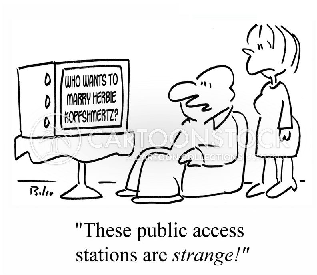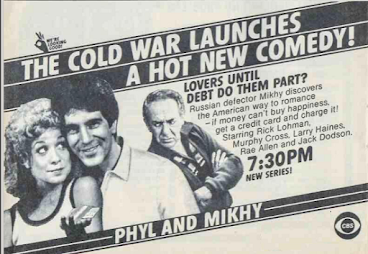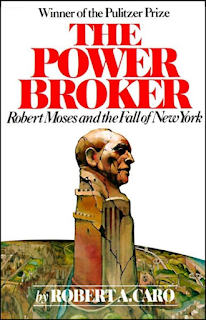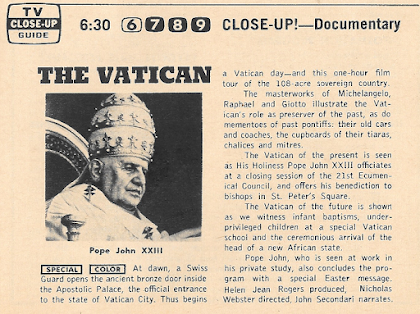I thought we'd try a little experiment this week.
Last week, I pointed out in passing that TV's Christmas season seemed to start earlier and earlier every year; today, it pushes right up against Thanksgiving. (Excluding Christmas movies; I'm pretty sure some FAST network is already showing
next year's movies, while this year's movies started somewhere around Halloween—or was it Labor Day?)
Now, where was I? Oh yes; in order to prove this hypothesis, we'll take a look at two other issues of TV Guide in addition to this week's issue from 1982. They're from similar points in the month: one from December 4, 1953, the other from December 3, 1966. Is there a difference in how television programmed Christmas back then, or is it all just my imagination? Let's see just what each issue tells us.
We'll start with 1953, and the tale of the tape is pretty easy: there is no Christmas programming this week. Now, that doesn't mean there isn't anything Christmassy on, but most of what you see concerns cooking or decorating ideas for the holidays—how to make a Christmas mobile, for instance, or a table centerpiece with a Christmas motif. The singers on Bob Crosby's daytime variety show (2:30 p.m. CT, CBS) offer a Christmas tune or two, and Omnibus (Sunday, 4:00 p.m., CBS) gives viewers a look at the Christmas windows in NYC's Lord and Taylor department store. Otherwise, that's it.
There's a logical explanation for some of this; as of 1953, there are no animated Christmas specials, and most of the weekly variety shows will air their special episodes closer to Christmas itself. We know that the shopping season is in full swing; there's an article about how toys based on television characters are a hot thing this year, and there's a note in the Teletype that RCA-Victor is putting out a record of Dragnet's complete Christmas episode ("The Big Little Jesus"), which I'm sure would make a fine gift for those who want to relive the moving story over and over. So my bet is that there are plenty of Christmas commercials on the the air, but nothing yet as far as specials.
Fast-forward thirteen years to 1966, and we can see right away that times have changed. On Sunday (5:30 p.m. PT, NBC), it's the second showing of
Rudolph, the Red-Nosed Reindeer, with all kinds of commercials featuring General Electric's suggestions as to what would make good gifts. ABC's special
The Saga of Western Man (Wednesday, 8:00 p.m.) has a show with an explicitly Christmas theme: "Christ Is Born," a recreation of The Nativity and the history surrounding it. It's sponsored by B.F. Goodrich; I'll bet at least one commercial will be for Goodrich's "For a Musical Merry Christmas," the third volume in their annual Christmas series. On Friday, CBS reruns Tchaikovsky's "The Nutcracker" (7:30 p.m.), narrated by Eddie Albert, with Edward Villella, Patricia McBride, and Melissa Hayden.
There are also specials that are non-Christmas but function as outstanding vehicles for Christmas advertising: Wednesday's Hallmark Hall of Fame presentation of "Blithe Spirit" will have a slew of commercials for Christmas cards—Hallmark always coordinates its shows to align with major card-sending holidays, and after all, it wouldn't do any good to advertise them once it became too late to mail them, would it? There's also a Frank Sinatra special Wednesday on CBS, and that same network's "The Glass Menagerie," with Shirley Booth, Hal Holbrook, and Barbara Loden, on Thursday. But in total we have only three holiday specials and, once again, there are no variety specials.
Now look at how things are in 1982. We start on Saturday, with the acerbically funny movie The Man Who Came to Dinner (7:00 p.m., WGBH in Boston), and A Disney Christmas Gift, scenes with holiday themes from Disney cartoons and animated features. (8:00 p.m., CBS) Monday evening, with a CBS doubleheader: A Charlie Brown Christmas at 8:00 p.m. ET, followed by Bugs Bunny's Looney Christmas Tales at 8:30; opposite them, it's Rudolph's Shiny New Year (8:00 p.m., ABC) On Tuesday, it's another CBS doubleheader, and now we're seeing the variety specials: Johnny Cash's Merry Memphis Christmas, with June Carter Cash, Rosanne Cash (no relation), Crystal Gayle, and Eddie Rabbitt (9:00 p.m.), followed by Andy Williams' Early New England Christmas, with Dorothy Hamill, Aileen Quinn, James Galway, and Dick Van Patten. (10:00 p.m.)
On Thursday, we've got a pair of movies: White Christmas (8:00 p.m., WLVI in Boston), and It's a Wonderful Life. (9:05 p.m., WENH in Durham, NH, repeated Friday on WMEB in Orono, ME) But that's not all; HBO is running Laurel and Hardy's March of the Wooden Soldiers and Rich Little: A Christmas Carol throughout the month, including this week; the same goes for Hans Christen Andersen's The Snow Queen, seen several times this week on various PBS stations. Inexplicably, Cinemax also has an Easter movie, Quo Vadis, throughout the week. Quite a difference from years past, don't you think? And in case you're wondering, Rudolph was already on last week; December 1, solidifying its standing as the first Christmas special of the year.
Obviously, one of the reasons for the plethora of programs we're seeing here is simply that there are more of them than in years past, and that's even taking into consideration that the first animated special, Mr. Magoo's Christmas Carol, went into syndication in 1970, while the first program of any kind to become an annual Christmas special, Gian Carlo Menotti's opera Amahl and the Night Visitors, hadn't appeared on TV since the late 1970s. In addition, any variety specials are going to come early in the season (for the convenience of advertisers) since there aren't any weekly variety shows anymore.
Now, before we go too far with this, let me stress that I'm not against Christmas programs; from December 1 on, that's pretty much all we watch in the evenings, unless there's something else going on. I say the more programs, the merrier. And I don't mind Christmas commercials, either—who doesn't get a warm feeling remembering the
Norelco Santa, or Ed Herlihy
talking about Kraft recipes. (And that's not to mention the
General Electric elves in the original commercials that ran during
Rudolph.) For those of an age, those memories are as much a part of the Christmas season as the programs themselves.
What I
don't like is showing all your holiday inventory in the first two weeks of the season, as if the only reason for them to exist at all is as a vehicle for commerce. I
particularly don't like the cartoons that don't tell any story at all, but are around as a tie-in to the product they're trying to sell. (The
Santa Bear animated special, for instance.) Leave at least a little something for Christmas week itself, even if everyone's already done their shopping. (Remember, they have to spend those gift cards they receive!)
Fortunately, thanks to the plethora of viewing options out there, from FAST stations to on-demand services to the good old-fashioned cable stations, there are
options right up to Christmas Day and beyond (I mean, look at them!), and while a lot of them aren't particularly to my taste, beggars can't be choosers. Anyway, we've got our DVDs to keep us warm.
l l l
I don't want you to think that it's
all about Christmas this week; far from it. One of the feature programs of the week is the
Hallmark Hall of Fame's presentation of "Witness for the Prosecution" (
Saturday, 9:00 p.m., CBS), a remake of the classic Agatha Christie courtroom drama, one of the greatest ever made, starring Sir Ralph Richardson as barrister Sir Wilfred Robarts (played in the movie by Charles Laughton), Beau Bridges as Leonard Vole, the defendant (formerly Tyrone Power), Diana Rigg as Vole's wife (Marlene Dietrich), and Deborah Kerr as Sir Wilfred's nurse (Elsa Lanchester). Judith Crist praises the remake and the performances (while finding Bridges a bit lacking), even though she questions the need for such a remake in the first place. It would be a pity if it was because audiences won't watch a black-and-white movie, whether in 1982 or today.
Sunday is a night of specials on CBS, starting at 8:00 p.m. with An All Star Party for Carol Burnett. CBS took more than a little criticism a while back when they didn't take a flyer on the 90th birthday celebration for Carol (it wound up on NBC instead); it's nice to see them honoring her here. Among the guests are Steve Lawrence, Jimmy Stewart, Vicki Lawrence, Tim Conway, Tom Sellick, and Beverly Sills; there are also tributes from Lucille Ball, Bette Davis, Sammy Davis Jr., Monty Hall, Glenda Jackson, Jim Nabors, Jack Paar, and Burt Reynolds. I mention them all here to show that in this instance, "All Star" wasn't just hyperbole. There are also a few stars on hand for the seventh annual Circus of the Stars (9:00 p.m., CBS), although there are a few more examples of "stars" in this case. Mickey Rooney is the ringmaster, assisted by Scott Baio, Morgan Fairchild, Vincent Price, Martha Raye, Debbie Reynolds, and Isabel Sanford; among the performers the bigger names include Robert Culp, Roddy McDowall, Bob Newhart, Jean Marsh, and Brooke Shields.
NBC's blockbuster movie for the week is the made-for-TV Remembrance of Love (Monday, 9:00 p.m.), a somber reflection on the Holocaust (as timely now as it was back then, alas), with Kirk Douglas as a survivor of Auschwitz, traveling to Tel Aviv for the World Gathering of Holocaust Survivors—and to search for the girl he loved and lost during the war. Pam Dawber co-stars as Douglas's daughter, and Robert Clary appears as himself. Judith Crist gives it a guarded recommendation, saying that the recreation of the Holocaust Survivors event "overpowers the contrived plotting."
Now here's a series I have absolutely
no memory of. It's called
Gavilan (
Tuesday, 9:00 p.m., NBC), and perhaps I don't remember it because it's just another one of the many series that Robert Urich starred in; only 10 of the 13 episodes that were made were ever aired before it left the air in March. If I
had seen it, it likely would only have been because of the presence of Patrick Macnee as one of Gavilan's sidekicks. I never saw Bruce Boxleitner's
Bring 'Em Back Alive (8:00 p.m., CBS) either, but at least I'd heard of it; it's based on the life of big-game hunter Frank Buck. Well, I guess I can't remember everything.
Speaking of shows that weren't, shall we say, memorable, there are a couple more on Wednesday; Tales of the Gold Monkey (8:00 p.m., ABC), starring Stephen Collins, is, like Bring 'Em Back Alive, an obvious attempt to cash in on the excitement generated by Raiders of the Lost Ark; like Bring 'Em Back, it doesn't last very long; 17 episodes for the former, and 22 for the latter. This reminds me of the fad that started in the wake of Animal House; there were three shows based on that, and none of them did very well either. The other little-known series on Wednesday is Seven Brides for Seven Brothers (8:00 p.m., CBS), based "loosely" on the movie of the same name, and starring Richard Dean Anderson. It, too, lasts for 22 episodes, but Richard Dean Anderson will make out just fine. I tell you, though, these series made no impression on me; frankly, I was surprised to find out they lasted as long as they did.
After all that, it was a relief to come to Thursday's listings and see some familiar names: Magnum, P.I., Simon & Simon, and Knots Landing on CBS; Fame, Cheers, Taxi, and Hill Street Blues on NBC; and Joanie Loves Chachi, Star of the Family, Too Close for Comfort, It Takes Two, and 20/20 on ABC. Okay, Star of the Family (10 episodes) and It Takes Two (22 episodes) weren't smash hits; still, you can see what a blockbuster night of television it was on all three networks.
One of the things I miss about television today is that it's so hard to go over the top nowadays. Take Friday's episode of Dallas (9:00 p.m., CBS), in which "J.R. and Sue Ellen's wedding party is interrupted by a brawl between Cliff and the Ewing brothers." Now that was exciting television back then, but today it's just another episode of Real Housewives or one of those other reality shows. Back then you could watch Dallas and enjoy it guilt-free; today, you just shake your head at what the world has come to—a real-life comic book.
l l l
It's been awhile since a regular-season college basketball game drew much attention. After all, even the best teams usually wind up losing several games a year, and they're all getting into the post-season tournament anyway, so the stakes aren't very impressive. It wasn't always that way, though, as we see in William Gildea's article about how Ted Turner's cable superstation, WTBS, outbid the networks for coverage of next Saturday night's highly-anticipated game between Ralph Sampson's Virginia Cavaliers and Patrick Ewing's Georgetown Hoyas. "The game," Gildea says, "has stirred the imagination of fans across the country like no other since 1968, when [Kareem] Abdul-Jabbar's UCLA Bruins took on the Elvin Hayes-led University of Houston in the Astrodome." That game, college basketball's Game of the Century, drew a then-crowd of more than 52,000, and was the first regular season college basketball game ever broadcast nationwide in prime time, on the syndicated TVS network.
The game isn't quite a cable exclusive; with only 34 percent of homes nationwide having access to basic cable, and with the demand for the game far outstripping the supply so to speak, WTBS winds up brokering agreements with local stations in major markets to show the game on broadcast TV. Nevertheless, WTBS's victory represents not only a landmark for television—the first time a cable network has outbid the legacy networks for a major sporting event other than boxing—it's a harbinger of things to come. TBS and its sister station, TNT, will eventually add the NBA, the NHL, the NFL (for a time), and the Final Four to its stable of programming, while more and more major games—not just "niche" sports like tennis and golf—move to cable stations such as ESPN and USA. Today, finding a big game on regular television seems to be the exception rather than the rule; except for the NFL, which might explain why it continues to be the top sport on television, and in every other way of life.
As for the game in question (which
you can see here), it's a good-but-not-great game, won by Virginia 68-63.
l l l
Speaking of which, Jefferson Graham says that "the hot new approach in pay-TV is charging a fee for special events," known as pay-per-view, and he asks if "Paying to see the Super Bowl" is what's next. Graham discusses the recent history of PPV events, such as a recent special airing of Star Wars that earned $2.43 million without even appearing in the theater, thanks to 324,000 people who paid an average of $7.50 to watch it on television. The Rolling Stones broadcast the final concert of last year's American tour to about 25 percent of the total PPV audience, earning $3.7 million, and The Who's "farewell" concert (yeah, right) from Toronto in a couple of weeks will be looking to do the same. And a special showing of the Broadway show The Pirates of Penzance, with Linda Ronstadt, Rex Smith, and Kevin Kline, will be debuting in theaters and PPV the same day.
Studios admit to being worried about the competition, and there are whispers that some might boycott some releases in protest of PPV. Meanwhile, the networks are taking the long view, but concede that competition from pay-cable, and particularly PPV, will hurt them. John Severino, president of ABC, worries that there will be less of an audience for theatrical films by the time they show up on free TV. On the flip side, the studios are enthusiastic, to say the least. "There is no question in my mind," says MGM/UA chairman Frank Rothman, "that the ultimate release pattern is PPV as the first source before theatrical." And so on and so on.
Well, just what did wind up happening here? It's kind of hard to say; PPV on TV has, for the most part, been confined to sports, particularly wrestling, boxing, and MMA; plays, musicals, and other special events have wound up in the theaters, thanks to Fathom Events and similar services. And as for the movie industry, during the virus scare there was a moment where it appeared on-demand streaming would take the place of the theater experience completely, with Warner Bros. and Universal releasing movies in theaters and streaming simultaneously, but by 2022 it was already proclaimed a "dead" practice. Still, the amount of time movies spend in the theater shrinks by the day, with some of them making only a cursory appearance in your neighborhood metroplex. As is so often the case, we know what doesn't work anymore, but we have yet to find out for sure what does. We just know that the Super Bowl isn't headed for PPV—at least, not yet.
l l l
You know that I consider myself second to none when it comes to admiring classic television. At that, I don't think it's ever occurred to me to compare television's sitcoms to the classic French farces of Victorien Sardou and other artists of the Gilded Age. And yet that's precisely the question being asked by Sam Toperoff, professor of art at Hofstra University. Sardou, a master of the comédie de boulevard, or boulevard comedy, in which "all the characters would have a chance to display just about every frailty and foible known to man." Dialogue is crisp and witty, with fast-paced action, misunderstandings, and Toperoff calls it "a beautifully crafted piece of machinery."
Which brings us to 1980s sitcoms, as Toperoff wonders if we have anything like boulevard comedy today. He concedes that "[a]t first glance, the comparison may seem absurd," but then begins to build his case. Like boulevard comedy, today's sitcoms feature ordinary people—"waitresses, cops, entrepreneurs, taxi drivers, maids, schoolteachers, secretaries and soldiers." Like good theater, the best sitcoms are built around a standard set, be it the home living room or the workplace office. Dramatic tension exists, in the conflict between, for example, Judd Hirsh and Danny DeVito's characters in
Taxi. Characterizations of human weaknesses abound, but not too much exaggeration, lest the character become a caricature, "not really worth caring about as a human being." Toperoff cites Archie Bunker as an example of this "delicate balance," through which "we learn something about inadequacy in the process—Archie's and our own."
"Just read any of the plot lines to the dozens of situation comedies listed each week," Toperoff says, "and you'll discover the heart of the old boulevard play." "George Jefferson discovers that Louise has taken a job at his competitor's cleaning establishment." On 9 to 5, "Judy is fired and throws the office into a buzz by posing as a man to regain her job." Laverne & Shirley is a "beautiful" example of the boulevard play staple: "a pair of friends—one wise, the other dissolute—[who] set about trying for a day or two to be something they are not." On the other hand, there's Bosom Buddies. "It wasn't unusual, in a Sardou farce, for a young man to spend the latter part of the evening in drag—that was often the comic peak. In Bosom Buddies, it was the comic premise, and a remarkably narrow one. So the show became a predictable, one-note exercise."
I'm not sure how I feel about Toperoff's analysis, whether he's reading too much into all this, or if I've underestimated some of the shows he mentions. And he worries that some of the best examples, shows like Barney Miller and WKRP in Cincinnati, have gone off the air recently, while broader caricatures such Too Close for Comfort and Three's Company, continue on. But then he tunes into an old episode of The Honeymooners, a classic comedy theater done "not for 600 ladies and gentlemen on a glittering Parisian stage once a season, but for the masses every week." It is with that realization that, "maligned as the sitcom may have been over the years, if is, at its best, a superb piece of work. It not only tickles the funny bone; it can touch the heart." And maybe that's what we all need nowadays, n'est-ce pas? TV
































